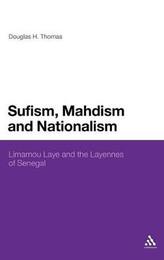
|
Sufism, Mahdism and Nationalism: Limamou Laye and the Layennes of Senegal
Hardback
Main Details
| Title |
Sufism, Mahdism and Nationalism: Limamou Laye and the Layennes of Senegal
|
| Authors and Contributors |
By (author) Dr Douglas H. Thomas
|
| Physical Properties |
| Format:Hardback | | Pages:176 | | Dimensions(mm): Height 234,Width 156 |
|
| Category/Genre | African history
Sufism and Islamic mysticism |
|---|
| ISBN/Barcode |
9781441169075
|
| Classifications | Dewey:297.83 |
|---|
| Audience | | Undergraduate | | Postgraduate, Research & Scholarly | |
|---|
| Illustrations |
1 illus
|
|
Publishing Details |
| Publisher |
Continuum Publishing Corporation
|
| Imprint |
Continuum Publishing Corporation
|
| Publication Date |
5 April 2012 |
| Publication Country |
United States
|
Description
Limamou Laye, an Islamic leader from present-day Senegal, has proclaimed himself the reincarnation of Muhammad, with his son later proclaiming himself to be a reincarnation of Jesus Christ. Limamou Laye established a tariqa, or Sufi organization, based upon his claims and the miracles attributed to him. This study analyzes Limamou Laye's goals for his community, his theology; as well as the various elements - both local and global - that created him and helped him to emerge as a religious leader of significance. This book also explores how the growth of Islamic communities in Senegambia stems from an evolving conflict between the traditional governments and the emerging Islamic communities. Douglas H. Thomas demonstrates that Sufism was the obvious vehicle for the growth of Islam among West Africans, striking a chord with indigenous cultures through an engagement with the spirit world which pre-Islamic Senegambian religions were primarily concerned with.
Author Biography
Douglas H. Thomas is Assistant Professor of History at Grambling State University, USA.
ReviewsThis lucidly written book is a must read for undergraduate and graduate students of the history of Islam in Africa. * Journal of Islamic Studies * This beautifully written book depicts vividly how Mahdi, Sufism and Lebu Nationalism converged in the Western corner of Senegal, producing a fascinating and captivating history of a movement. Its publication will provide fresh ideas, new perspective and an original interpretation of how Africans indigenized Islam to their local conditions. -- Mohammed Hassen Ali, Georgia State University, USA
|